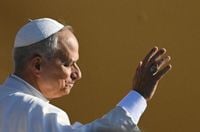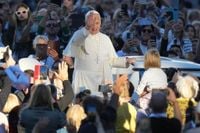Pope Leo XIV is set to embark on his first international journey as pontiff, with a historic dual visit to Turkey and Lebanon scheduled for late November and early December 2025. The Vatican’s announcement, made on October 7, 2025, marks a momentous occasion for both the Catholic Church and the broader Christian community, as the Pope seeks to promote unity, peace, and hope in two countries where Christianity’s ancient roots interweave with modern-day challenges.
The trip, which will take place from November 27 to December 2, begins in Turkey, where Pope Leo will make a pilgrimage to İznik, the ancient city of Nicaea. This visit is timed to commemorate the 1,700th anniversary of the First Council of Nicaea—a pivotal moment in Christian history that produced the Nicene Creed, a profession of faith still recited by Catholics and Orthodox Christians worldwide. As reported by Vatican News, Pope Leo described the occasion as “a truly important moment” and emphasized, “For all Christians, it will be a moment of genuine unity in faith. We must not miss this historic opportunity. But it’s not about looking back—it’s about looking forward.”
The Council of Nicaea, convened in 325 A.D., predates the great schisms that eventually divided Eastern and Western Christianity. Its anniversary, therefore, carries deep ecumenical significance, offering an opportunity to underline the shared theological roots of Christianity’s often-divided traditions. According to CatholicVote and Reuters, the Pope’s pilgrimage is expected to reinforce ongoing efforts to strengthen Catholic–Orthodox unity. While in Turkey, Leo is also expected to meet with Ecumenical Patriarch Bartholomew, the spiritual leader of approximately 300 million Eastern Orthodox Christians, further highlighting the trip’s ecumenical aims.
But the significance of the journey extends beyond Christian unity. Both Turkey and Lebanon are home to ancient Christian communities that have faced mounting pressures from Islamist radicalism and political instability in recent years. The Vatican has voiced concern for the survival and well-being of these communities, which remain vital to the Christian presence in the Middle East. As Rev. John Chryssavgis, an adviser to Patriarch Bartholomew, told Reuters, Pope Leo’s visit “shows he is seeking to express and affirm his identity as a Christian in a world of many different creeds, where all people, regardless of religion and race, are called to live together in mutual understanding.”
Immediately following his time in Turkey, Pope Leo will continue to Lebanon from November 30 to December 2 for a pastoral visit. The Mediterranean nation, with its significant Christian minority and unique political system that reserves the presidency for a Maronite Christian, has long been a focal point for Vatican diplomacy. Lebanon’s Council of Catholic Patriarchs and Bishops expressed their enthusiasm in a statement: “We welcome this historic event with great joy and renewed hope. We hope that this apostolic visit to Lebanon will bring peace and stability and be a sign of unity for all Lebanese, Christians and Muslims alike, at this critical stage in our nation’s history.”
Lebanon’s recent history has been marked by hardship. The country is still reeling from years of economic crisis, the fallout of the devastating 2020 Beirut port explosion, and a bruising conflict between Israel and Hezbollah that only ended with a ceasefire in November 2024. According to The Associated Press, the formation of a new, reformist government has ended a two-year political vacuum, but instability and the threat of renewed violence remain. Pope Leo, speaking to reporters outside the Villa Barberini at Castel Gandolfo, acknowledged the suffering of Lebanon’s people, stating, “I will have the opportunity to once again proclaim the message of peace in the Middle East, in a country that has suffered so much.”
The Pope’s visit to Lebanon fulfills a long-held wish of his predecessor, Pope Francis, who had hoped to visit the country after the Beirut explosion but was prevented by health and security concerns. “He wanted to embrace the people of Lebanon after the explosion, after everything they’ve endured,” Pope Leo told Vatican News. “We will try to bring this message of peace and hope.”
The timing of the trip is also significant. The Vatican’s announcement coincided with the anniversary of the October 7, 2023, Hamas attacks in southern Israel, an event that continues to reverberate throughout the region. During his remarks to journalists, Pope Leo condemned the attacks as “terrorism” and called for efforts to reduce hatred and promote peaceful solutions. “It makes you think about how much violence and evil humans are capable of,” he said. “We must reduce hatred, we must return to the ability to dialogue, to seek peaceful solutions.”
The Pope’s comments come amid ongoing controversy over the Vatican’s stance on the Israel-Gaza conflict. Cardinal Pietro Parolin, the Vatican’s Secretary of State, recently condemned both the “inhuman massacre” committed by Hamas and what he described as a “disproportionate massacre” by Israel in Gaza. These statements drew criticism from the Israeli Embassy to the Holy See, which accused Parolin of “problematic use of moral equivalence.” Pope Leo, however, declined to be drawn into the dispute, simply stating that “the cardinal expressed the Holy See’s opinion very well.”
Throughout his pontificate, Pope Leo has consistently called for peace and dialogue in the Middle East, a message he is expected to reiterate during his visits to Turkey and Lebanon. The Vatican has not yet released a detailed itinerary for the trip, but it is anticipated that the Pope will meet with political leaders, church officials, and representatives of other faiths in both countries. These meetings will provide opportunities for the Pope to exercise what the Vatican calls “soft power”—using his moral authority to encourage reconciliation, mutual respect, and the protection of vulnerable communities.
In addition to commemorating the Council of Nicaea and promoting interfaith dialogue, the Pope is expected to honor the victims of the 2020 Beirut port explosion while in Lebanon. In August 2025, he sent a message to a service commemorating the 200 killed in the blast, and observers expect him to address the tragedy during his visit.
The last papal visit to Lebanon was made by Pope Benedict XVI in September 2012, making Pope Leo’s journey the first in over a decade. For Lebanon’s Christians, who make up about one-third of the country’s population, the visit is especially meaningful. As Patriarch Bechara Boutros Raï, leader of Lebanon’s Maronite Church, put it, “We hope that this apostolic visit to Lebanon will bring peace and stability and be a sign of unity for all Lebanese, Christians and Muslims alike, at this critical stage in our nation’s history.”
As the world watches, Pope Leo XIV’s upcoming pilgrimage to Turkey and Lebanon stands as a powerful gesture—one that seeks to heal old wounds, foster unity, and offer hope to communities long beset by division and adversity.


